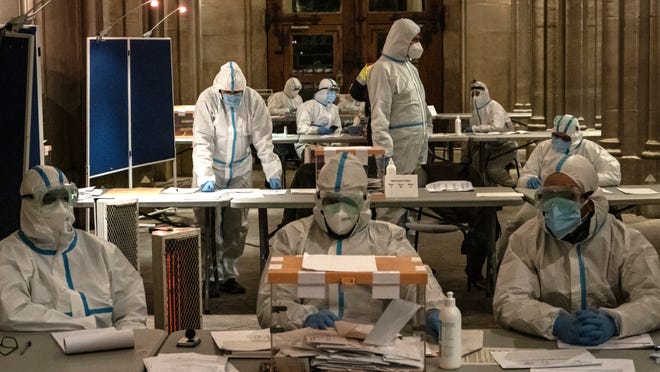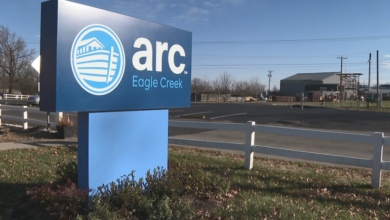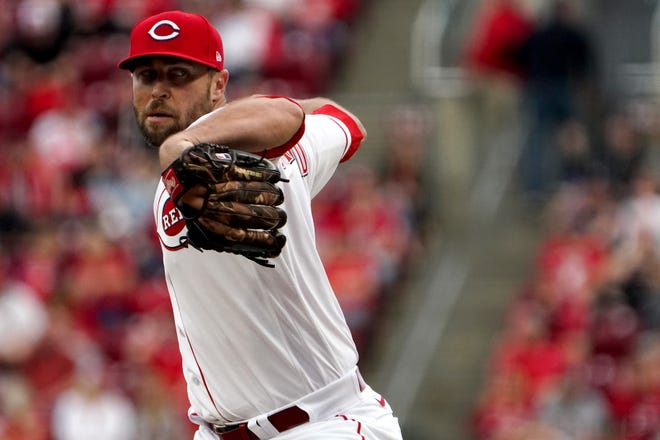
A winter storm with icy roads, power outages and dangerously low temperatures snarling traffic from coast to coast was delaying shipments of COVID-19 vaccines to Florida and Texas.
Jared Moskowitz, director of the Florida Division of Emergency Management, said the state has been alerted that the frigid weather system impacting 25 states will delay the Monday-Tuesday shipment of vaccines. It was unclear how many doses would be affected and when deliveries would resume.
Texas state health officials, due to receive more than 400,000 additional vaccine doses this week, don't expect deliveries until at least Wednesday. And vaccine appointments in the cities of Houston and Austin were expected to be canceled again Tuesday because of the severe winter weather.
Massive power outages across Houston on Monday included a facility storing 8,000 doses of Moderna COVID-19 vaccine, leaving health officials scrambling to find takers at the same time authorities were pleading for people to stay home. Rice University also abruptly began offering vaccines to students on its closed Houston campus after Harris Health System told the school it had about 1,000 vaccines that “were going to go to waste," said Doug Miller, a university spokesman.
“The window was just a couple hours. They have to take care of it quickly,” Miller said.
USA TODAY is tracking COVID-19 news. Keep refreshing this page for the latest updates. Want more? Sign up for our Coronavirus Watch newsletter for updates to your inbox and join our Facebook group.
In the headlines:
►President Joe Biden is extending a ban on home foreclosures for federally backed mortgages by three months and expanding a mortgage relief program to provide relief for families struggling financially amid the COVID-19 pandemic.
►Governors are asking Biden for more say in how the federal government is distributing COVID-19 vaccines to local pharmacies and community health centers in their states.
►The World Health Organization on Monday authorized use of AstraZeneca's COVID-19 vaccine. The move will help boost supplies for millions of people worldwide through the U.N.'s COVAX effort, which aims to help vaccinate poorer countries.
►A patient transferred from Connecticut directly to a New York hospital has tested positive for the South African variant of the novel coronavirus, Gov. Andrew Cuomo announced Monday. Prior to then, 17 cases of the South African variant had been found in eight states, according to the U.S. Centers for Disease Control and Prevention.
►San Francisco is the latest California city to temporarily shutter a mass vaccination site due to lack of vaccine, joining Los Angeles in pausing inoculations amid a national shortage, even as new federal-state vaccination sites open.
? Today's numbers: The U.S. has more than 27.6 million confirmed coronavirus cases and 486,300 deaths, according to Johns Hopkins University data. The global totals: More than 109.14 million cases and 2.4 million deaths. More than 70 million vaccine doses have been distributed in the U.S. and about 52.8 million have been administered, according to the CDC.
? What we're reading: There's no 'giant national campaign' for COVID-19 vaccine education. Why? Experts say there's a better way.
NBA outlines protocols for All-Star game despite pushback from stars
The NBA revealed its health and safety protocols for the All-Star break in a memo to teams, including protocols for the All-Star game on March 7. The game has not been officially announced, and Lebron James is among prominent players who expressed dismay at the idea of conducting an All-Star game amid a pandemic.
All players are required to undergo COVID-19 testing while the league takes a break March 5-10. Players participating in All-Star events – either the game, dunk contest or 3-point shootout – are required to travel to Atlanta on March 6 via private transportation, and participation is dependent on returning negative tests on March 6 and March 7.
– Jeff Zillgitt
Experts fear fourth surge this spring
COVID-19 infection and hospitalization rates are falling nationwide, but experts talk in dire terms about what will happen if variants of the virus are allowed to surge this spring. The U.S. saw a spike in cases last spring, mainly in the Northeast, last summer in the South, and November through January pretty much everywhere. As the nation's death toll from COVID-19 approaches half a million people, public health experts said they dread the possibility of a fourth wave. Three state legislatures lifted mask mandates in recent days, and New York and Massachusetts eased restrictions on restaurant seating in time for Valentine's Day.
"It's like we're trying our best to help the virus rather than stopping it," said Theodora Hatziioannou, a virologist and research associate professor at the Rockefeller University in New York City.
– Karen Weintraub
Gov. Andrew Cuomo defends New York's response in nursing homes
After boasting of forging a winning battle plan against COVID-19, Cuomo faces a critical moment after an aide admitted to withholding nursing home data from the public after receiving a federal inquiry. Fallout from the scandal is growing as lawmakers mount a bipartisan push for further investigation of the Cuomo administration’s COVID-19 response, citing a series of revelations that lifted the veil of secrecy over the true coronavirus death toll for New York nursing homes, which topped 13,000 residents as opposed to the 8,700 previously reported.
“Thousands of New Yorkers lost family in nursing homes to COVID-19, a pain made worse by the inability to comfort their loved ones in their final hours,” U.S. Rep. Antonio Delgado, D-N.Y., wrote Sunday on Twitter. “They deserve answers and accountability.”
Meanwhile, Cuomo launched a lengthy defense on Monday, conceding state officials should have released the nursing home data earlier but struggled to do so because of the pandemic workload and politicized federal inquiry by the Department of Justice under former President Donald Trump.
– David Robinson, New York State Team
ER visits down last year, but overdoses up: Experts blame COVID-19
Many Americans stayed away from the emergency room when the nation went under lockdown for fear of contracting COVID-19 at the hospital. While this led to an overall decline in emergency department visits, a recent study shows weekly trips to the ER for drug overdoses were higher in 2020 than in 2019.
Researchers from the Centers for Disease Control and Prevention studied more than 180 million ER visits from Dec. 30, 2018, to Oct. 10, 2020, and found that weekly counts of all drug overdoses were up to 45% higher in 2020 than in 2019, according to the study published Feb. 3 in the peer-reviewed JAMA Psychiatry. Opioid overdoses, specifically, increased about 29% compared to before the pandemic.
Overall visits to the emergency room plummeted when COVID-19 lockdown measures were implemented in March 2020, decreasing about 43% compared to the same timeframe in 2019. However, drug overdoses experienced only a slight decrease from March 29 to April 11, about 4% compared to 2019, before increasing again.
“That all drug and opioid overdose emergency department visits did not decrease in a similar manner to other emergency department visits is especially compelling, suggesting an increase in overdose burden during the pandemic,” study authors said.
– Adrianna Rodriguez
Contributing: James Call, USA TODAY NETWORK-Florida Capital Bureau; The Associated Press.










